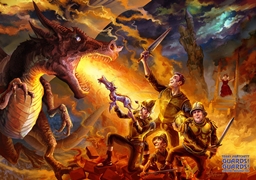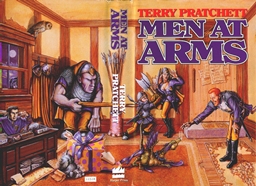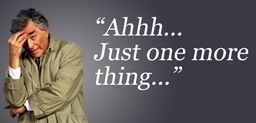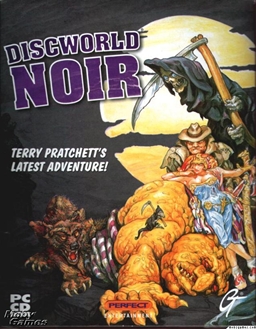The Public Life of Sherlock Holmes: Terry Pratchett’s ‘City Watch’
 As readers of this column are certainly aware, I’m quite the fan of detective and private eye novels. Beyond just the guy that the whole thing is named after. As I mentioned in last week’s post on Isaac Asimov’s Caves of Steel, I’ve made several posts about the genre.
As readers of this column are certainly aware, I’m quite the fan of detective and private eye novels. Beyond just the guy that the whole thing is named after. As I mentioned in last week’s post on Isaac Asimov’s Caves of Steel, I’ve made several posts about the genre.
Related yet distinct is the police procedural (though some stories, like the aforementioned Caves, fit in both genres). As you can guess from the name, these focus on police officers, rather than private operatives. They are all over television, such as Castle, CSI (insert name here), Hill Street Blues, and brand new shows like Battle Creek. Ranging from Dragnet and The Streets of San Francisco to Hawaii Five O (which lasted 12 seasons before coming back in its current incarnation).
The literary police procedural, while popular, has a lower profile than its television version and is definitely overshadowed by the private eye story.
Evan Hunter (better known as Ed McBain), who I consider THE master of the mystery short story, wrote more tales of New York’s 87th Precinct than I can count: and I can count to one, two, three, many (that’s a Terry Pratchett joke). Probably my favorite straight police procedurals are Tony Hillerman’s novels about The Navajo Tribal Police. The subject of a future post, they are superb police mysteries, set in the Indian reservation lands of the Four Corners. (I ended up doing a pretty solid three-part series on those fantastic books)
Having looked a Robert E. Howard’s weird tales-style hardboiled stories two weeks ago and at one of Isaac Asimov’s science fiction detective novels last week, it’s no surprise that I turn to fantasy in this week’s post. I’ve already looked at Glen Cook’s Garrett, PI and Douglas Adams’ Dirk Gently. So this time around, it’s Terry Pratchett’s police procedurals featuring Ankh-Morpork’s City Watch.
 Pratchett (who passed away on March 12) wrote the marvelous Discworld series, a fantasy satire. Eight of the Discworld novels featured the City Watch, the police force of Ankh-Morpork, the city-state that serves as the primary locale of the series. I just wrote a Pratchett post back in January.
Pratchett (who passed away on March 12) wrote the marvelous Discworld series, a fantasy satire. Eight of the Discworld novels featured the City Watch, the police force of Ankh-Morpork, the city-state that serves as the primary locale of the series. I just wrote a Pratchett post back in January.
In the first of those books, Guards! Guards!, the once functional Night Watch is down to three members (a fourth having just been killed foolishly chasing a lawbreaker). The Night Watch, consisting of an alcoholic commander, Sam Vimes, Sergeant Fred Colon and Corporal Nobby Nobs, is a complete joke and goes out of its way to avoid enforcing the law. The other police units, such as the Day Watch and Palace Guard, consider the Night Watch useless.
Carrot Ironfoundersson, a strapping lad raised as a dwarf (think Will Ferrell in Elf, just done cleverly, not stupidly), joins the Watch and actually memorizes the city’s ordinances and laws. His first day, he arrests the head of the Thieves Guild. That sort of thing just isn’t done. But by the end of the story, the Watch is a real group of coppers.
In the second book, Men At Arms, the Patrician (ruler of the city and a wonderful character) has ordered an aggressive affirmative action hiring policy. So, the four-(hu)man watch grows, adding a werewolf, dwarves and trolls. By the end of the story, the re-christened City Watch is absolutely a force to be reckoned with.
In Guards! Guards!, Pratchett borrows from the most famous axiom in the mystery field: “Once you have ruled out the impossible then whatever is left, however improbable, must be the truth. The problem lay in working out what was impossible, of course. That was the trick, all right.”
Then, with a Pratchett twist, “There was also the curious incident of the orangutan in the night time…” The orangutan, of course, is the magically transformed librarian at the wizard academy, Unseen University.

Columbo, starring Peter Falk, is one of the best known (and just best) television crime shows ever. The rumpled, seemingly dumb inspector often, after finishing questioning a suspect, would remember one more question (often smacking himself in the head), and gain some valuable piece of information.
In Men at Arms, Vimes has just finished up questioning the head of the Assassins Guild:
“Good, good, thank you very much.” Captain Vimes paused at the doorway, then thumped the palm of his hand on his forehead. “Sorry, excuse me – mind like a sieve these days – what was it you said was stolen?”
Not a muscle, not a sinew, moved on Dr. Cruces’ face. “I didn’t say anything was stolen, Captain Vimes.”
Vimes gaped at him a moment. “Right! Sorry! Of course you didn’t…Apologies…Work getting on top of me, I expect. I’ll be going, then.”
The door slammed in his face.
This is classic Columbo folks, done perfectly. You can see Peter Falk in this scene. LOVE me some Columbo!
Sam Vimes, in charge of the Watch, is the centerpiece of these stories. In the beginning, he is a beaten down relic with just the faintest flickering inside of a real policeman. That flicker becomes a flame and he holds the Watch stories together, going from a gutter-drunk (literally) in his first scene to someone able to stand up to the Patrician (a rare species, indeed).
 Quite a few characters are added to the Watch over the course of the eight books, and a few even die. However, there’s a steady continuity to the Watch books.
Quite a few characters are added to the Watch over the course of the eight books, and a few even die. However, there’s a steady continuity to the Watch books.
Pratchett was the Voltaire of our time. The fact that he achieved that status through the genre of fantasy is truly remarkable. The entire series is full of sarcasm, satire and frequent examples of poking fun at mankind and society. I mean, it’s all over the place. Obviously, in books with a heavy dose of crime in the plot, he had plenty of opportunities.
“Owning a hundred slum properties wasn’t a crime, though living in one was, almost.”
“If you had enough money, you could hardly commit crimes at all. You just perpetuated amusing little peccadilloes.”
Though he moved away from this as the series went on, in the early books, Pratchett liberally included footnotes: often hilarious. One example from Men At Arms:
“Suicide for example. Murder was, in fact, a fairly uncommon event in Ankh-Morpork, but there were a lot of suicides. Walking in the night-time alleyways of the Shades was suicide. Asking for a short in a dwarf bar was suicide. Saying ‘Got rocks in your head?’ to a troll was suicide. You could commit suicide very easily, if you weren’t careful.”
I think that the series suffered a bit as Pratchett dropped the footnotes.
Jingo stands out as a favorite. In it Pratchett absolutely skewers misplaced nationalism and expansionism. Of course, the Watch is right in the middle of affairs.
Just about every book in the Discworld series is worth reading (I’m not including the Tiffany Aching books here). And many are effectively standalone (though it helps to read others in order). So, I think you’re doing well by grabbing just about any Discworld book. But I suggest grabbing Guards! Guards and Men at Arms (I re-read these for this post) and getting a feel for The Watch books.
Terry Pratchett was a brilliant writer and I highly recommend checking him out.
You can read Bob Byrne’s ‘The Public Life of Sherlock Holmes’ column here at Black Gate every Monday morning.
He founded www.SolarPons.com, the only website dedicated to the ‘Sherlock Holmes of Praed Street’ and blogs about Holmes and other mystery matters at Almost Holmes.
Working my way through the third Watch book, Feet of Clay (Golems feature prominently). Another line I liked that mentioned slums:
“(Vimes)…picked up a copy of Twurp’s Peerage, or, as he personally thought of it, the guide to the criminal classes. You wouldn’t find slum dwellers in these pages, but you would find their landlords.
And, while it was regarded as pretty good evidence of criminality to be living in a slum, for some reason owning a whole street of them merely got you invited to the very best social occasions.”
As a lifelong New Yorker who went to school for public administration and worked in municipal government, the Watch books are my favorites (except for the morally suspect Snuff). More than Vimes, I think the main character is the wondrous, festering, beautiful, and terrifying city of Ankh-Morpork.
The Watch sequence and the Moist von Lipwig books are love songs to cities and their endless possibilities.
[…] tear myself away from Terry Pratchett as I’m finishing up my second City Watch book re-read since last week’s post. Pratchett’s Discworld truly is a […]